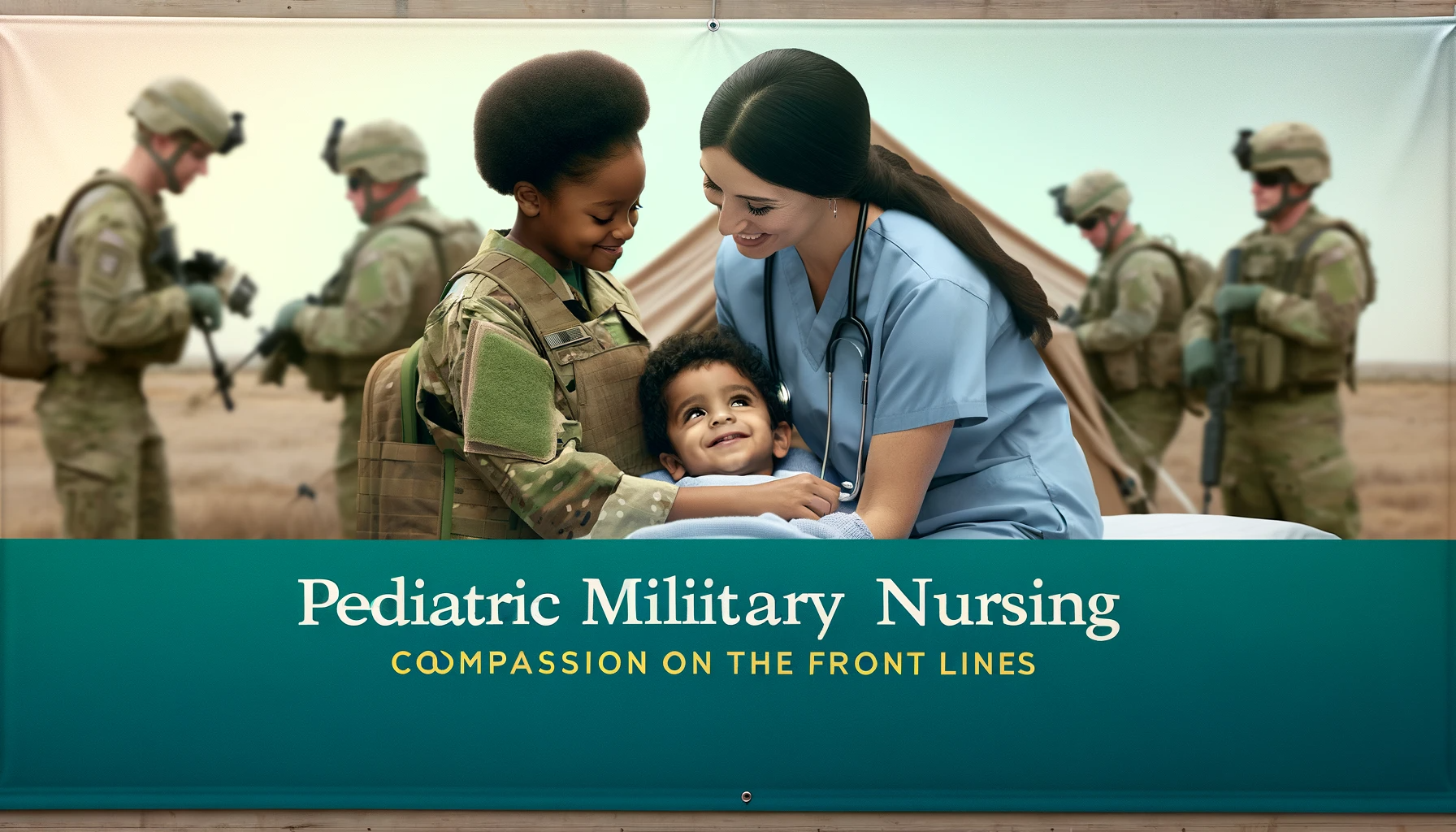Pediatric Military Nursing: Caring for Young Patients
Pediatric nursing within the military context stands as a testament to the delicate interplay between medical proficiency and heartfelt compassion. The realm of pediatric military nursing goes beyond traditional care, delving into the complex needs of young patients who grow up in the shadow of military life.
This article aims to unravel the layers of this noble profession, highlighting the unique physical, emotional, and social needs of these young patients, the practical skills required for common procedures, and the adaptability needed in the face of military-specific considerations.
Understanding Unique Physical, Emotional, and Social Needs
Physical Needs
Children in military families face distinct physical health challenges. These include conditions exacerbated by the stress of relocation, the psychological impact of parental deployment, and environmental changes. Nurses in this field must be adept at recognizing and treating conditions like asthma, obesity, and stress-related physical ailments, tailoring their approach to the unique military family lifestyle.

Emotional and Social Needs
The emotional landscape for children in military families is often marked by frequent relocations, the absence of a deployed parent, and the inherent uncertainties of military life. Pediatric nurses in this context need to be not just caregivers but also confidants, equipped to offer emotional support and counseling to navigate these challenges.
Practical Skills for Common Procedures
Administering Medication
The task of administering medication to children is nuanced, requiring an understanding of pediatric pharmacology and the ability to engage young patients who may be resistant or fearful of medication.
Comforting Techniques
The art of comforting is crucial in pediatric nursing. Techniques such as establishing a rapport, utilizing distraction during procedures, and creating a calming environment are essential tools in a nurse’s arsenal.
Handling Emergencies
Emergency situations in a military setting can be unpredictable. Pediatric nurses must be prepared for a range of emergencies, from administering CPR to managing acute episodes of chronic conditions, with a specific focus on the pediatric population.
Military Considerations
Deployment-related Issues
The emotional toll of deployment on children can be profound. Pediatric nurses play a critical role in helping these young individuals understand and cope with the absence of a parent, providing stability in a time of change.
Family Separations
The impact of frequent relocations and separations on children in military families can manifest as isolation and anxiety. Pediatric nurses should have resources and strategies to assist children in adjusting to new environments and coping with separations.

Conclusion
The role of a pediatric military nurse is multifaceted, challenging, yet immensely rewarding. By comprehending the unique needs of children in military families and equipping themselves with the necessary skills and empathy, nurses can ensure the provision of exceptional care. Their role transcends traditional nursing boundaries, making a profound difference in the lives of these young patients and their families.
FAQs
What special considerations should pediatric military nurses take when dealing with relocation-related stress in children?
Relocation is a common occurrence in military families, and it can be a significant source of stress for children. Pediatric nurses should be aware of the potential impact that frequent moves can have on a child’s emotional well-being. They should take the time to understand each child’s unique coping mechanisms and provide support accordingly. Additionally, providing resources such as counseling services and peer support groups can help children adjust to new environments more easily.
How can pediatric military nurses assist with separations between parents and their children due to deployment?
Deployment is an inevitable part of military life, and it often involves long periods of separation between parents and their children. Pediatric nurses should be equipped with strategies to help ease this difficult transition for both the parent and child. This may include providing information and resources on how to maintain a strong connection through methods such as video calls or sending care packages. They can also provide emotional support and reassurance to both the parent and child during this challenging time.
How can pediatric nurses effectively administer medication to children who are resistant or fearful?
Administering medication to children can be a challenging task for pediatric nurses, especially if the child is resistant or fearful. It is important for nurses to build a trusting relationship with the child and their family in order to create a positive and comfortable environment during medication administration. This may involve explaining the importance of the medication and its potential benefits, using techniques such as distraction or relaxation, and involving the child in decision-making when appropriate. Additionally, it is essential for nurses to have thorough knowledge about different methods of administering medications and the potential side effects in order to ensure safe and effective care for their young patients.
How can pediatric nurses promote healthy lifestyle choices for children?
As healthcare professionals, pediatric nurses play an important role in promoting healthy lifestyle choices among children. This is crucial in preventing and managing chronic diseases, such as obesity and diabetes, which are becoming increasingly prevalent among children.
What are some comforting techniques that can be used to reduce anxiety in young patients?
Pediatric nurses are well aware of the anxiety and fears that young patients may experience during their medical visits. To help alleviate these anxieties, nurses can use comforting techniques such as distraction, humor, and therapeutic play. Distraction techniques involve engaging the child in a fun activity or giving them something to focus on while undergoing a procedure. Humor can also be used to lighten the mood and make the child feel more at ease. Therapeutic play involves using toys or games to allow the child to express their feelings and gain a sense of control over their situation.
How do pediatric nurses collaborate with other healthcare professionals?
Collaboration is an essential aspect of healthcare for children as it ensures comprehensive and coordinated care. Pediatric nurses work closely with other healthcare professionals such as pediatricians, child life specialists, social workers, and therapists to provide the best possible care for their young patients.
Enhancing Nursing Education Through Simulation-Based Learning






